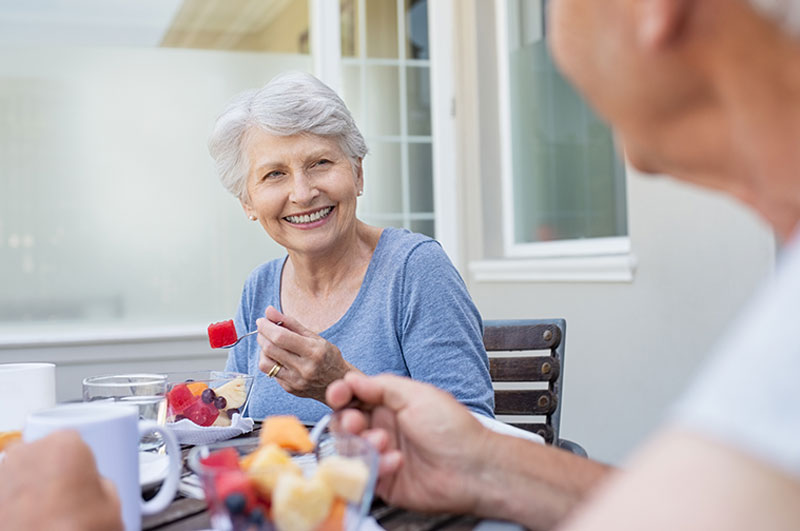
Discover easy ways to increase fiber intake for older adults.
If the older adults in your life are more likely to indulge in the many junk and fast food choices that are so readily accessible, they are in good company. Even though these foods are quick and easy, they are in many instances full of calories, cholesterol and fat and lack fiber as well as other key nutrients that are needed to fuel aging bodies. The fact is, as few as 5% of us are getting enough fiber – something vitally important for seniors.
Key Reasons Why Fiber Is So Important
Fiber’s overall health benefits include:
- Weight control: Low in calories and slower to digest, foods that are typically high in fiber help people to feel fuller longer.
- Lowered cholesterol: With fiber in the digestive system, your body absorbs reduced levels of cholesterol.
- Blood sugar regularity: Due to the fact that high-fiber foods take longer to be digested, steady blood sugar levels can be sustained.
- Better digestive tract functioning: Fiber in the intestinal tract stimulates the intestines, easing issues from constipation.
- Decreased cancer risk: Adequate amounts of fiber in the diet help safeguard against certain kinds of cancer, such as colon cancer.
Top Ways to Increase Fiber Intake
If an older adult’s diet has been lacking in sufficient levels of fiber, it’s important to incorporate more fiber slowly and gradually. Introducing too much fiber all at once can bring about bloating and gas, as well as other side effects. Help seniors to increase fiber intake over several days, while making sure to drink a lot of water as well, which can help cut down on unwanted symptoms.
These foods with a high fiber content are a fantastic place to start. Remember that ideally, adults should be including 14 grams of fiber for every 1,000 calories consumed every day, which translates to roughly 24 grams for women and 38 grams for men.
- Apples (4.4 grams in a single raw, average-sized apple)
- Raspberries (6.5 grams per cup)
- Pears (5.5 grams in one raw, medium-sized pear)
- Strawberries (3 grams per cup)
- Avocado (10 grams per cup)
- Bananas (3.1 grams in one single average-sized banana)
- Carrots (3.6 grams per cup)
- Broccoli (2.4 grams per cup)
- Beets (3.8 grams per cup)
- Brussels sprouts (3.3 grams per cup)
- Artichoke (6.9 grams in a single raw globe)
- Kidney beans (12.2 grams per cup, cooked)
- Lentils (13.1 grams per cup, cooked)
- Chickpeas (12.5 grams per cup, cooked)
- Split peas (16.3 grams per cup, cooked)
- Oats (16.5 grams per cup, raw)
- Popcorn (1.15 grams per cup, popped)
- Quinoa (5.2 grams per cup, cooked)
- Almonds (4 grams per 3 tablespoons)
- Sweet potatoes (3.8 grams per medium-sized boiled potato without skin)
- Dark chocolate (3.1 grams per 1-ounce piece)
With a wide variety of options to satisfy each senior’s individual taste, it’s not difficult to add more fiber into the diet and enhance senior health.
At Hearts at Home In-Home Care, one of the top home health agencies in Kansas City, KS and the surrounding areas, we understand how a well-balanced diet for older adults helps safeguard general health and wellness so that older adults can continue to live active and engaged lives. Our highly-trained care team is here to help encourage healthy snacking and eating habits for seniors and provide companionship during meals, and any other time, day or night. Our care team can also grocery shop, plan and prepare nourishing snacks and meals that are personalized to specific dietary needs or restrictions, and even clean up the kitchen afterwards.
To discover all about the many ways Hearts at Home In-Home Care’s care team can help a senior you love maintain nutritious eating habits and more, contact us at 913-440-4209 to get started and to schedule an in-home consultation free of charge today. For a full list of the areas where we provide care, please visit our Service Area page.
Hearts at Home holds a Kansas Home Health Agency Class B Operating License in good standing. Our license ID number is T-014-046.
